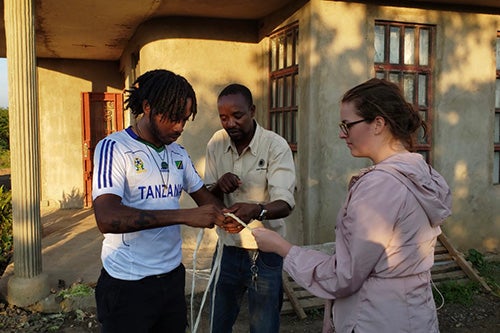
So, what’s the importance of studying abroad, you might ask? Studying abroad exposes you to an entirely different world of opportunities. You are able to engage in new cultural activities and broaden your perspectives of how people live, work, and study around the world. Students who study abroad come back with newfound independence, career interests, and valuable leadership skills.
Student Spotlight: Robert Whitmore IV
Major: global studies Minor: global markets and society
Career Goal: To work on economic development of Africa through research, education, and the promotion of cross-cultural collaborations within the African diaspora
Robert has studied abroad three times on short-term, faculty-led courses already during his undergraduate career, and he plans to spend a full semester abroad this spring in Kenya. In the summer of 2018, he visited Dar es Salaam, Tanzania. About a year later (March 2019), Robert was able to explore Cape Town, South Africa. In that same year (May through June 2019), he visited Arusha, Tanzania. He was able to find out about all these amazing study abroad opportunities through friends, his global studies professor, and his academic advisor, Malcolm Jamal.
When asking Robert what drew him to studying abroad in these particular locations, he said, “Africa is often depicted as a place that is torn with tribal warfare, disease, and poverty. This definitely does not capture the full scope of the continent, as it is not only the place of human origin, but also an abundance of natural resources and cultural diversity unparalleled anywhere else.”
He wanted to show others what his journey was like and get to experience the “full scope” of the continent. While traveling the continent of Africa, he learned how much “power” his American identity held. Being American in both Tanzania and South Africa gave him privilege. The local people in both places treated him better and quickly associated him with a “higher level of status and wealth.” This stood out to him because he felt like it was the opposite of what he experiences in the United States. It was eye-opening to see how local people there viewed him, just because he came from America.
Robert, explains choosing to study abroad in Africa has by far been the “best decision (he’s) made in (his) college career.” He often feels like he battles with who he identifies as and that sometimes it is easier to relate and be more “in tune” with his American side than African side. Being in Africa and experiencing the culture has helped bring him close to his origins.
Throughout his time in both South Africa and Tanzania he participated in a lot of hands-on activities (fieldwork) that allowed him to really navigate and immerse himself in the rich culture. He did not take any classes, due to the programs being short, but still learned so much.
Each one of his experiences has impacted him in some way.
“The common thread between each study abroad experience is the fact that each country is considered a ‘developing nation,’” he said. This means that the countries were “ingenious and resourceful.” Even though the countries were working to be improved, the local people still had a smile on their faces, despite the level of poverty they were experiencing. This stood out to Robert, because it showed there was no “lack of motivation” and they did not need material and luxurious things in order to achieve happiness and fulfillment in their lives.
If there was one piece of advice Robert would give to someone trying to study abroad, it would be to try and find a program that has a “balance between tourism and practical field-work experience, with a prioritization on the field-work experience that will help build transferable and competitive skill sets.” The university offers many study abroad opportunities, and it is “imperative to take advantage of these opportunities,” because the top employers from all industries worldwide are recruiting students who are culturally diverse.
Reminder:
If you are interested in studying abroad, the College of LAS has many resources to help you get started.
You can start by visiting the LAS International Programs website and explore all of the different places you can go. Here are just a few examples of what LAS students do while studying abroad:
• Interning with a UN agency
• Fulfilling pre-med requirements
• Completing a major or minor in a foreign language
• Marine biology research at sea
The application deadline for summer and fall programs is Saturday, Feb. 15. For more information, stop by the Life + Career Design Lab to meet with a LAS International Programs advisor in Lincoln Hall 2040 from 1-5 p.m. Monday through Friday.